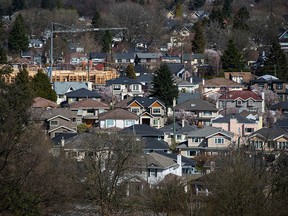Homeowners in markets experiencing housing shortages need to declare their property as occupied by the March 31 deadline

Homeowners in many B.C. cities — notably in the Lower Mainland, eastern Fraser Valley, Kelowna and southern Vancouver Island — will be getting declaration forms in the mail soon for the provincial speculation and vacancy tax.
The tax, introduced in 2018 by former premier John Horgan’s NDP government, applies to homes in communities where housing is in high demand.
Start your day with a roundup of B.C.-focused news and opinion delivered straight to your inbox at 7 a.m., Monday to Friday.
Thanks for signing up!
A welcome email is on its way. If you don't see it, please check your junk folder.
The next issue of Sunrise presented by Vancouver Sun will soon be in your inbox.
The program expanded in January to more communities experiencing acute housing shortages, including North Cowichan, Duncan, Ladysmith, Lake Cowichan, Lions Bay and Squamish. But those areas won’t need to declare until the 2024 tax year.
Anyone who uses a home as a primary residence or rents it out to long-term tenants doesn’t have to pay the tax, and there are a number of other exemptions.
The B.C. government notes 99 per cent of homeowners in the province are exempt, but everyone in the taxable areas must declare annually. This year’s deadline is March 31.
While more than 90 per cent of homeowners declare online, you must first receive a letter in the mail that includes a unique code needed to complete the declaration. Those letters have been going out since the second half of January, so many homeowners will have already received their letter or will get theirs soon.
Taxes on empty houses now exist at multiple levels of government, including at the municipal level in the City of Vancouver proper. Vancouver has its own, separate empty-homes tax. The deadline to declare for that passed on Feb. 2.
The federal government also has empty housing initiatives, including a one-per-cent tax introduced at the start of 2022 on vacant or underused properties, though as with the other taxes there is a long list of exemptions.


